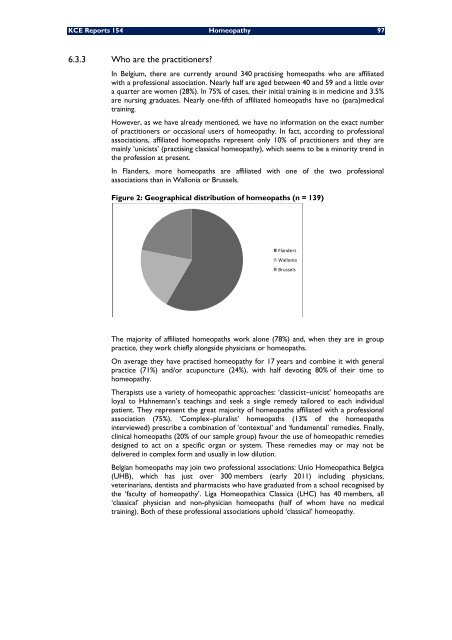Etat des lieux de l'homéopathie en Belgique - KCE
Etat des lieux de l'homéopathie en Belgique - KCE
Etat des lieux de l'homéopathie en Belgique - KCE
You also want an ePaper? Increase the reach of your titles
YUMPU automatically turns print PDFs into web optimized ePapers that Google loves.
<strong>KCE</strong> Reports 154 Homeopathy 97<br />
6.3.3 Who are the practitioners?<br />
In Belgium, there are curr<strong>en</strong>tly around 340 practising homeopaths who are affiliated<br />
with a professional association. Nearly half are aged betwe<strong>en</strong> 40 and 59 and a little over<br />
a quarter are wom<strong>en</strong> (28%). In 75% of cases, their initial training is in medicine and 3.5%<br />
are nursing graduates. Nearly one-fifth of affiliated homeopaths have no (para)medical<br />
training.<br />
However, as we have already m<strong>en</strong>tioned, we have no information on the exact number<br />
of practitioners or occasional users of homeopathy. In fact, according to professional<br />
associations, affiliated homeopaths repres<strong>en</strong>t only 10% of practitioners and they are<br />
mainly ‘unicists’ (practising classical homeopathy), which seems to be a minority tr<strong>en</strong>d in<br />
the profession at pres<strong>en</strong>t.<br />
In Flan<strong>de</strong>rs, more homeopaths are affiliated with one of the two professional<br />
associations than in Wallonia or Brussels.<br />
Figure 2: Geographical distribution of homeopaths (n = 139)<br />
Flan<strong>de</strong>rs<br />
Wallonia<br />
Brussels<br />
The majority of affiliated homeopaths work alone (78%) and, wh<strong>en</strong> they are in group<br />
practice, they work chiefly alongsi<strong>de</strong> physicians or homeopaths.<br />
On average they have practised homeopathy for 17 years and combine it with g<strong>en</strong>eral<br />
practice (71%) and/or acupuncture (24%), with half <strong>de</strong>voting 80% of their time to<br />
homeopathy.<br />
Therapists use a variety of homeopathic approaches: ‘classicist–unicist’ homeopaths are<br />
loyal to Hahnemann’s teachings and seek a single remedy tailored to each individual<br />
pati<strong>en</strong>t. They repres<strong>en</strong>t the great majority of homeopaths affiliated with a professional<br />
association (75%). ‘Complex–pluralist’ homeopaths (13% of the homeopaths<br />
interviewed) prescribe a combination of ‘contextual’ and ‘fundam<strong>en</strong>tal’ remedies. Finally,<br />
clinical homeopaths (20% of our sample group) favour the use of homeopathic remedies<br />
<strong><strong>de</strong>s</strong>igned to act on a specific organ or system. These remedies may or may not be<br />
<strong>de</strong>livered in complex form and usually in low dilution.<br />
Belgian homeopaths may join two professional associations: Unio Homeopathica Belgica<br />
(UHB), which has just over 300 members (early 2011) including physicians,<br />
veterinarians, <strong>de</strong>ntists and pharmacists who have graduated from a school recognised by<br />
the ‘faculty of homeopathy’. Liga Homeopathica Classica (LHC) has 40 members, all<br />
‘classical’ physician and non-physician homeopaths (half of whom have no medical<br />
training). Both of these professional associations uphold ‘classical’ homeopathy.

















